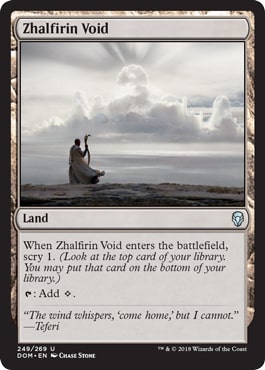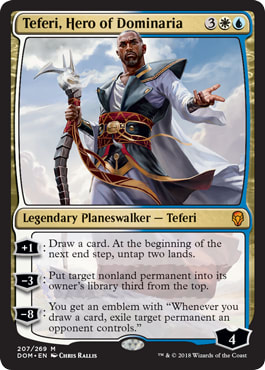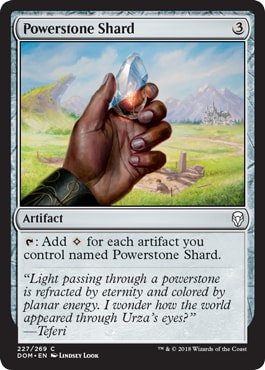Dominaria is where we go to reflect, and, as a logical consequence, where we go to look forward. That's how it seems, anyway. Dominaria has always been in some sense a "history plane". Early sets often looked backward into its past, to the Ice Age and the Brothers' War and the fall of the Sarpadian Empires and so on. It also has historically determined the future of the storyline. Time Spiral saw a number of legacy characters struggling to fix the legacy issues of the past, and their actions resulted in a radically different path for what kinds of stories might be told about Planeswalkers. Dominaria the set has done something similar, focusing on history and its renewal, and introducing a number of new players both on and off plane that will shape the storyline for presumably some time.
Invasion follows the pattern, too, though maybe a little more abstractly. It concluded the Weatherlight Cycle, drawing together all the strands of several years of storyline and a whole lot of deep history from Magic's past, but it, too, dramatically shaped the future. Most obviously, the villains of the Invasion Cycle fought against a future where we all have cool robot limbs and venom sacs and oil for blood, and tragically their vision ultimately won out. But beyond that, by simply murdering a whole ton of characters, the storyline's future paths were truncated. That's not necessarily a good or bad thing, it's just a thing that is true. If Taysir gets killed by Urza, there's much less chance of someone later doing more with the character. So, there's less chance someone might explore in more depth the relationship between Taysir, Kristina, and Daria, or bring it to a satisfying conclusion. Shaping the future also shapes the future of the past . . . or uh maybe the presumed past of that future?
Oof, this is all getting a bit dizzying. I think it's important to think about, though, because Dominaria as a set and a story succeeds and fails largely on these grounds. It's self consciously a narrative creation driven by questions of past and future and how they interact. More than that, though, it's a kind of nexus point within a long term serial narrative. Serial narrative is all about past and future.
In fairness, so is all reading. If you've been following me for a while this is probably old hat, but I'm a big fan of reader-response models of criticism, and one of the big ideas to come out of that field is the sense of how we make our way through a text, constructing an idea of the story's world from the narrative's past, projecting our ideas into the story's future, and then experiencing the thrill or frustration of having our expectations met or dashed.
A reader of Magic's story, whether reading in serial form or not, might reasonably predict that there's no way Teferi will get his Planeswalker Spark back. Teferi gave up his Spark to seal one of the big sucking holes in reality plaguing Dominaria during Time Spiral, and in the process lost his chance to bring his home country of Zhalfir back from the nothingness he stuck it into for safe keeping a while. So, a reader at a certain point in time might construct an idea of Teferi's story as cosmic tragedy, a failure that could never be undone. A reader at a different point in time, meanwhile, might construct an idea of the story of how finally we're going to see Zhalfir come back, after all these years, and it's going to be so cool, and wait what the hell, it's gone forever? BRADY NOOOOO!
The way texts twist toward or away from a reader's predictions has real emotional and thematic weight. This can be tricky, because it makes analysis very relativistic. How you interpret a story depends on where you stand, and what aspects of that story's past are most visible to you as markers of its future. What might seem like a logical choice based on part of the mountain of information a long running serial narrative accumulates could end up coming off as misguided or really suspect. (Making one of the oldest, most developed cultures on your world an African-inspired nation, getting a ton of people super invested in that culture, then losing the entire culture in a time hole might raise a few eyebrows, for example.)
Serial narrative makes these kind of tensions indefinitely open-ended. That's in some ways pretty great, because it offers the opportunity to change the past whenever the story needs it. I don't mean through retcon, but through how reading works. Kelly Digges recently wrote a Twitter thread on retcons and he foregrounds the thread with two useful qualifications: "This has never been mentioned before" and "this used to be one way, now it's different" are "just... storytelling." They're not retroactive continuity, they're just how narrative, like, works, when we read things.
They sort of do look like retcons, though, because they do reach back into time and fiddle around with the narrative as it exists in our brains. So much of reading involves filling in gaps, according to reader-response theorist Wolfgang Iser. The story can't give us all the detail we need, so we make connections and inferences and imaginative leaps ourselves. When we're presented with new information, then, maybe we do have to retcon -- establish continuity, retroactively -- the story that exists in our own brains.
So, if Teferi DOES get his spark back, that's not a retcon but it might be a . . . READcon no wait actually that sounds terrible forget I even suggested it.
That's, of course, exactly what happens in Dominaria. Teferi gets his spark back. So, what does that do to the story? Well, I think it alters the themes somewhat. One of the best parts of Dominaria's written story, in my opinion, was the relatively lengthy amount of time the narrative lingered over Teferi's history after the events of Time Spiral. In the last 60 years as a mortal -- well, relatively mortal, since his association with time magic has resulted in him aging very slowly -- Teferi had to come to grips with the way he failed to protect Zhalfir. Given he had literally one job and it was to protect Zhalfir, losing it in a time hole wasn't great. And it turns out there's a bunch of people related to folks trapped in nothingness who're REAL mad at him.
What really struck me reading these parts of the story, though, was the way it forced me to reread Teferi as he appears in the Invasion Cycle -- literally, in fact, as I revisited the books for other articles. I had this conception of Teferi as basically one of The Good Planeswalkers, folks like Bo Levar and . . . uh . . . Mantarqua? I guess? who didn't go around dooming entire civilizations to ruin or declaring themselves gods or what have you. Teferi might have lost Zhalfir, but it wasn't, you know, his fault.
This was obvious from the events in Invasion. Urza Planeswalker's plans for defeating Phyrexia required that Zhalfir bear terrible losses, just as many other places on the world would. Teferi tricks Urza into helping him obliterate a large Phyrexian portal, then channels that energy into the spell to phase Zhalfir out of reality. Rather than being strongarmed by a man who would sacrifice anything to destroy Phyrexia, he saves his people. Teferi's one of the good guys!
Dominaria emphasizes, however, the arrogant carelessness with which Teferi behaved when he decided to remove an entire chunk of a continent from reality. And . . . it turns out Invasion emphasized it, too:
"There will be tidal waves," Urza said darkly. "Thousands will die."
"Millions have been saved," Teferi replied. "This is how I save my people. This is how you and I differ."
"Yes," Urza replied. "This is how we differ."
The irony of that last statement was never apparent to me before Dominaria. It was, in effect, not there, not canon for me before Dominaria showed Teferi struggling to make sense of one of Urza's old puzzles. Over the course of this narrative, and the narrative of him facing angry descendants of those he failed, it became obvious that Teferi and Urza were more similar than different, both careless wielders of far too much power. It's not a new theme for Magic, but for the first time I saw Teferi's actions as not an exception but another instance of the same principle. Teferi's perspective as a mortal, dealing with Urza's endless nonsense, highlighted the way that Urza was a missing stair among the community of Planeswalkers, a perpetual liability so powerful that everyone just works around him.
But it also revealed the fact that all 'Walkers, simply by virtue of their power, are missing stairs in the making.
So, what does it mean that Teferi just sort of gets his powers back in kind of a perfunctory way?
I mean, it's a little odd, right? After all that conflict, Teferi just sort of gets his spark in a powerstone handed to him by Jhoira, with the comically abrupt not-really-explanation-not-even-a-sentence of "The Mana Rig", and while we get some ambivalence on Teferi's part, that's largely that. That's not necessarily a bad thing -- reading is dependent on gaps, remember -- but it's a good example of some of the weirder pacing issues Dominaria's story had. There are some passages that, like Teferi's two somewhat self contained stories, take a leisurely approach to exploring the character dynamics, and then abruptly the story will switch to a highly compressed mode. We're left to largely fill in the gaps on Teferi's internal thoughts in these passages on our own. And, of course, we're also left to fill in the gaps of what the heck happened with "The Mana Rig" that let Jhoira just sorta . . . retrieve Teferi's spark and stick it in a rock.
I think this shifts the meaning somewhat as well. If it was that easy for Teferi to get his powers back -- and we have no textual indication to suggest that it wasn't, because, again, there just isn't any exploration of how it was done -- does that soul searching Teferi had to do have the same impact? If he just has to think about it for a few hours, what does that mean? These things, too, might prompt a reconsideration of the past.
Dominaria left me with a lot of questions like this. Teferi's story is probably one of the most neatly and comprehensively explored threads. Others suffered far more from some weird compression (probably an artifact of the loss of the second Dominaria set to the Core Set) and lack of resolution. Dominaria left the future very open-ended . . . so open-ended that at times the present of the story was left rather empty.
And that's what we're going to explore next time.



























